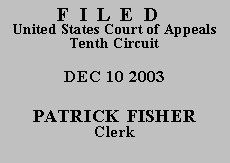

| UNITED STATES OF AMERICA,
Plaintiff-Appellee,
v.
ANTONIO GUZMAN-ESPINOZA Defendant-Appellant. |
No. 02-4191
(D.C. No. 2:00-CR-504-01-TS) (Utah) |
Anders holds that if counsel finds a case to be wholly frivolous after conscientious examination, he may advise the court and request permission to withdraw. Counsel must also submit to both the court and his client a brief referring to anything in the record arguably supportive of the appeal. The client may then raise any point he chooses, and the court thereafter undertakes a complete examination of all proceedings and decides whether the appeal is in fact frivolous. If it so finds, it may grant counsel's request to withdraw and dismiss the appeal. See id. at 744. Counsel provided Mr. Guzman-Espinoza and the government with copies of his appellate brief. Mr. Guzman-Espinoza has not filed a response, and the government submitted notification that it did not intend to file a response brief.
In his first letter to the district court, Mr. Guzman-Espinoza asserted that he was going to appeal because he believed he needed a second chance. In his second letter, he reminded the court that he had asked for an appeal in his earlier letter and notified the court that he had no attorney (although Mr. James Garrett was his attorney at that time). These two letters are the only documents in the record from Mr. Guzman-Espinoza, and neither of them states any reason meriting an appeal.
Having fully examined the proceedings as required by Anders, we conclude that Mr. Guzman-Espinoza's appeal is indeed without merit. It is important to note at the outset that Mr. Guzman-Espinoza entered a guilty plea on Counts 1, 3, and 4 of the indictment and thereby waived all non-jurisdictional challenges to his conviction. United States v. Dwyer, 245 F.3d 1168, 1170 (10th Cir. 2001) (quoting United States v. Wright, 43 F.3d 491, 494 (10th Cir. 1994)). Counsel also points out that Mr. Guzman-Espinoza's sentence was correct and falls within the parameters set forth in the United States Sentencing Guidelines. We agree, because Mr. Guzman-Espinoza's total offense level of 30 and Criminal History Category of II yields a guideline range of 108-135 months.
During his plea colloquy, the district court informed Mr. Guzman-Espinoza about the consequences of entering a guilty plea. Mr. Guzman-Espinoza responded that he understood the plea agreement and that he entered into the agreement voluntarily. After careful review of the entire proceedings, we agree with counsel that no non-frivolous grounds for appeal appear on this record. We see nothing in the record to indicate that Mr. Guzman-Espinoza's guilty plea was not knowing and voluntary, nor do we discern any error in the district court's acceptance of the plea or in the terms of the plea agreement. There are no sentencing issues for appeal.
Accordingly, we GRANT counsel's request to withdraw and we DISMISS the appeal.
ENTERED FOR THE COURT
Stephanie K. Seymour
Circuit Judge
*.After examining appellant's brief and the appellate record, this panel has determined unanimously that oral argument would not materially assist the determination of this appeal. See Fed. R. App. P. 34(a)(2) and 10th Cir. R. 34.1(G). The case is therefore submitted without oral argument. This order and judgment is not binding precedent, except under the doctrines of law of the case, res judicata, or collateral estoppel. The court generally disfavors the citation of orders and judgments; nevertheless, an order and judgment may be cited under the terms and conditions of 10th Cir. R. 36.3.